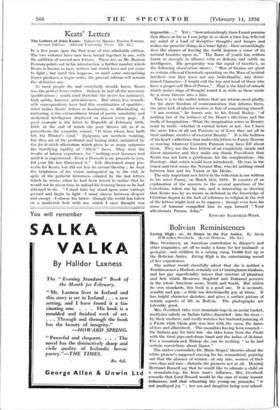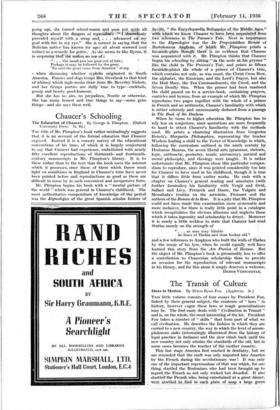Bolivian Reminiscences
MRS. OVERBECK, tut American contributor to Harper's and other magazines, set off to make a home for her husband—a geologist—and children in a mining camp 13,000 feet up in the Bolivian Andes. Living High is the entertaining record of her experiences.
The author would cheerfully admit that she is neither a Tomlinson nor a Hudson, certainly not a Cunninghame-Graham, and her gay superficiality -misses that mixture of phantasY and brio which Messieurs Siegfried and Duhamel perceive in the whole American scene, North and South. But within its own standards, this book is a good one. It is accurate, sensible and gay—a little too determinedly gay at times. It has bright character sketches, and gives a surface picture of certain aspects of life in Bolivia. The photographs are tolerably good.
Mrs. Overbeck rides over mountain-tops in an aerial bueket, meditates calmly on Indian babies discarded—into the river— by their mothers, and coolly watches her husband prancing at a Fiesta while Chola girls woo him with the caeca, the dance of love and allurement. The casualties having been counted-- the Indians pay for their fun—she rides home from the Fiesta with the tired pipe-and-drum band and the ladies of ill-fame. For a mountain-sick Bishop she can do nothing, " as he had certain convictions about liquor."
The author contradicts Dr. Marie Stopes' theories about the white pioneer's supposed, craving for his womankind, pointing out that the absence of women—at any rate, women of their own class and race—disturbs the pioneers not at all. Hearing Bertrand Russell say that he would like to educate a child on a mountain-top, far from man's influence, Mrs. Overbeck .remarks, that Lord Russell would be the sum of many human influences, and that -educating the- yonngi.e• n pinnacles " is not unalloyed joy " : her son and daughter being over school- going age, she turned school-maim and soon putaiic all thoughts alont the-AIngos-a repita,*lg. ssly provided myself with-,a strap And, . . advanced ort my goal with fire in ray eye" She is -correct in saying that the Bolivian native has known for ages all about seaweed-(ou' iodine) as a remedy for goitre. As she seems to like Byron, it is surprising tharshi'mikes no use sr:)(4', " . . . the sniall-Pox has gone out of late ; Perhaps-it may be-followed by the great. 'Tis said the great came from America " et seq.
—when discussing whether syphilis -originated in South America, Pansies and dogs tempt Mrs. Overbeek to that kind of whimsy which ingle-nooks draw, from Mr.-Beverley NiChols, and her Gringo parties are dully true to type—cocktails, gossip and hearty good-humour.
But she has no airs, no prejudices, Nordic or otherwise. She has many honest and true things to say—some grim, things—and she says them well.















































 Previous page
Previous page